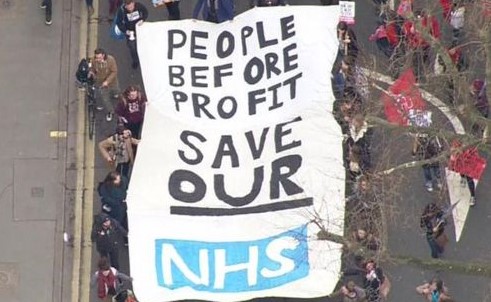By Mick Brooks
Our thoughts about Covid-19 must first be with those suffering and dying with the virus. But this article is about its effects on the world economy.
The onset of the virus has produced the biggest crash on global stock exchanges since the Great Recession of 2008. Falling share prices may not be of much direct interest to most Left Horizons readers, but it’s a clear sign of capitalist panic.
The outbreak of the virus began in Wuhan. In response, the whole of Hubei province is in lockdown. It has a population of 55 million – not much fewer than Britain. Covid-19 has since spread throughout east Asia and quickly extended its tentacles to Europe and every continent except Antarctica. This is the downside of capitalist globalisation.
Firms like Apple have outsourced components of their iPhone to China. This is all part of a worldwide division of labour. Apple and other key companies are finding that these parts may soon run out as the virus spreads, and their sales will collapse as a result. The firm MTA, in the affected part of Italy, has already closed down altogether. Since it is part of the global supply chain for car parts this could have worldwide repercussions throughout the automotive industry.
Growth expectations revised down
Will the virus become a pandemic? It is already having, and will continue to have, a profound depressing effect on the world economy as well as human health. Predictions of growth figures are already being revised down everywhere and may have further to drop. World GDP is set to expand by only 2.3% this year, the lowest rate since the great recession. China, the original epicentre of the coronavirus, whose economy has been dragging the world economy forward since 2008, is likely to be worst hit economically.
Comparisons have been made with the SARS epidemic of 2002 and 2003. Back then China represented only 5% of global GDP, but today it’s more than 16%. Not only has China become a world manufacturing centre in the meantime. It produces eight times as much as in 2003. It is also a huge market for western products. That is why drinks manufacturer Diageo is already counting the cost of the epidemic.
There is one other major difference. Back in 2003 world capitalism was experiencing a heady, speculative boom. Since 2008, economic growth has been wretched at best and, as Michael Roberts’ blog has demonstrated, is showing all the signs of slipping into a new recession. The coronavirus epidemic could well be the trigger that pushes it over the edge.
Capitalism subject to shocks
Capitalist economists like to present capitalism as essentially a stable economic system, occasionally subject to exogenous shocks. These ‘exogenous’ shocks are supposed to come from outside the capitalist economy. All this is basically an excuse, an apologia for the capitalist system. So the 2008 crash was said to be a ‘financial’ crisis, caused by excess speculation. Excess speculation there certainly was in the years running up to the Great Recession, but the crazy gambling was rooted in an economy that was going forward. Capitalism is a system of production for profit. The crisis was rooted in a crisis of profitability. The financial collapse was just the trigger for the onset of crisis in 2008. That was a real crisis of capitalism, wrecking people’s lives.
This is what really happened. The US Bureau of Economic Analysis (BEA) shows that in the 3rd quarter of 2006 the mass of pre-tax profits peaked at $1,865bn. By the 4th quarter of 2008 it bottomed out at $861bn. This collapse of profits would have caused a recession in any case, with or without a ‘financial’ crisis. Crisis is rooted in capitalist production.
It was the same story back in 1973. We were told the yarn that the world capitalist economy was in robust health. Then – bingo – there was an oil crisis, and it all went pear-shaped. There was indeed an oil crisis. As a result of the Yom Kippur war in October 1973 Arab oil-exporting countries imposed a boycott of oil exports to Western powers seen as supporting Israel. This was a purely political gesture. At the time the oil-exporting countries had no idea of the economic power they possessed.
Necessity manifested as ‘accident’
In fact the great post-War boom of 1948-73 was powered by cheap oil. By March 1974 oil prices had quadrupled, from $3 to $12 in six months. That pushed the world economy over the edge. The good times disappeared for ever. But left wing economists like Andrew Glyn and Bob Sutcliffe, in their book British capitalism, workers and the profit squeeze, demonstrated that the root cause of the slowdown was a crisis of profitability, which had been in process for years.
The German philosopher Hegel, upon whose work Marx and Engels based their ideas of dialectics, said that necessity can manifest itself as accident. The emergence of Covid-19 is apparently an accident. It is interacting with the rhythms of the capitalist economy, which are a permanent feature of the system.
So there are two reasons to worry about the coronavirus. It could easily become a full scale pandemic. Sporting events and concerts are being cancelled; schools are closing; Covid-19 is popping up everywhere, whatever we do to try to stop it.
The second reason, apart from the threat to health, is that the virus could precipitate a recession, and make it worse. It could help to devastate jobs and living standards. It is arriving just as the capitalist world economy is slowing down anyway. That is why it won’t be shrugged off like the SARS epidemic at a time of boom. Humans cannot at present prevent the emergence of viruses like Covid-19. But a planned socialist economy could prevent the obscenity of involuntary unemployment with its accompanying poverty.
Either way, the coronavirus is something to worry about.
March 2, 2020



